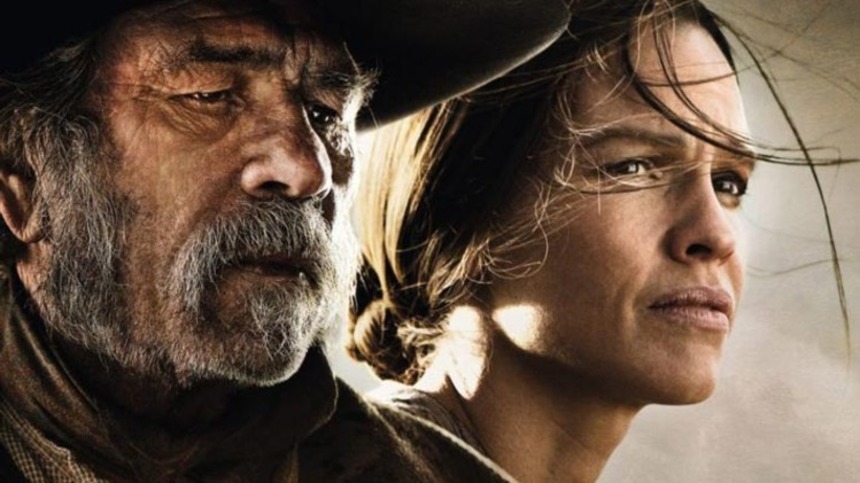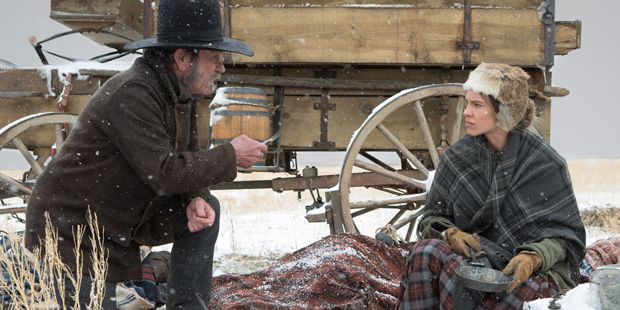Review: THE HOMESMAN Takes Tommy Lee Jones Out To Pasture

The Homesman is Jones' fourth directorial effort, if you count his two made for TV movies, The Sunset Limited (2011) and The Good Old Boys (1995). Although I can't vouch for those two, his previous theatrical helmer, 2005's The Three Burials of Melquiades Estrada, stands as one of the best films of its year, and can be considered an uneasy masterpiece. Three Burials harbored no shortage of Jones' affinity for author Flannery O'Conner's Southern fatalism tinged with a weird faith, as well as good dose of Sam Peckinpah's sun-bleached corpse-hauler Bring Me the Head of Alfredo Garcia, sans that film's brash cocksureness.
The Homesman shares Three Burials' penchant for telling it like it is, and also telling it covered with dirt and dust for good measure. Both are most assuredly unconventional, , but not unrelatable. Both star Jones, and feature plenty of horse riding and livin' on the land. In his older age, Jones certainly knows a thing or two about a thing or two, and wants to impart that via these uncomfortable tales of grizzled men and put-upon women transversing the unforgiving terrain to arrive at a destination they have little personal vested interest in. But, a man's gotta make good on his word.
But, there's a Levon Helm shaped hole in the heart of The Homesman, itself a proper period Western. Jones spins a fascinating if fraying yarn with the thing. It's at different times rough, lighthearted, tragic, shocking, odd, quirky, and extreme. The accusation that The Homesman doesn't know what it wants to be is understandable, perhaps even valid; except for the possibility that Jones truly was interested in concocting such a herky-jerky tonal hodge podge.
In a sense, he's demonstrating that life on the plains in the time of the American frontier was all of the above - such is "life", in all its many shades and flavors. The film, like real life, turns on a dime, from horrific infanticide to witty verbal exchanges to uncomfortable glimpses of mental illness, all in the instant of a straight cut from one scene to another. It is exclusively neither Peckinpah's west nor Little House on the Prairie. It is both and neither.

One thing that's made explicit throughout is that the time was particularly difficult for women. For most of the film, Jones is the sole male, escorting three deranged young ladies to a parsonage in Iowa, alongside of Mary Bee Cuddy, played by Hilary Swank. The three women are hauled in an empty wooden box cart, not unlike animals or luggage. Swank's self assuredly, competent frontier woman is one whose no-nonsense ways has kept her both ferociously alive and desperately lonely. She loves music, but there is none. Despite a solid trust and desirable acreage to her name, men reject her time again as "too bossy."
If the take-charge Ms. Cuddy was born in the wrong century, it should also be said that the men who marginalize and reject her were born with sexist blinders on. Jones makes no beef about things being the way they were. He doesn't apologize for his characters, or try to explain them. They, and their behaviors, so appalling and incorrect to us today, are nonetheless of accord with that world. But to what avail?
What The Homesman does right, it does better than most any modern Western: The lifestyles, the clothes, the drawls, and the weight of life - and lack of value thereof. In making this, Jones apparently called in every favor he could. Results are a scene or two each for John Lithgow, Tim Blake Nelson, James Spader, and Meryl Streep, and a production credit for Luc Besson. They stick out like sore thumbs, distracting from the otherwise fluid naturalism of it all.
And by the end, the journey having been a perilous one, rife with unexpected thematic turns and story shifts, even the most forgiving viewer is left wondering what it's all about. The movie's mixed-up, there's no doubt. The film is a disappointment, but a unique disappointment. It's high-minded grizzle isn't worth chewing on, yet it's world is one worth visiting.
The Homesman
Director(s)
- Tommy Lee Jones
Writer(s)
- Tommy Lee Jones (screenplay)
- Kieran Fitzgerald (screenplay)
- Wesley A. Oliver (screenplay)
- Glendon Swarthout (novel)
Cast
- Tommy Lee Jones
- Hilary Swank
- Grace Gummer
- Miranda Otto

Do you feel this content is inappropriate or infringes upon your rights? Click here to report it, or see our DMCA policy.






